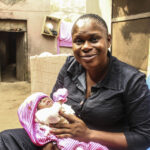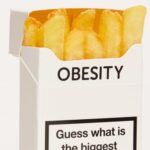All the rage in Finland, ‘Moses baskets’ could soon be coming to South African shores.
South Africa is exploring the possibility of giving boxes to mothers of newborn babies in an effort to reduce infant deaths.
The concept is based on a world-famous Finnish policy of giving every mother, regardless of her financial status, a cardboard box stacked with baby products if she attends health checks during her pregnancy. The box, which comes with a mattress and a blanket, can also be used as a crib for the baby.
Almost 40% of pregnant women in South Africa’s public health sector go for their first check-up only after their 20th week of pregnancy, figures from the Health Systems Trust’s 2015/2016 District Health Barometer show.
Studies have shown that the babies of pregnant women who visit a nurse or doctor early on in their pregnancies have better chances of survival because problems can be picked up in time.
Thirty-five out of every 1 000 babies in South Africa die before their first birthday, according to the Barometer. Compare that with Finland’s mortality rate of two in 1 000, according to 2015 World Bank data.
The devil is in the detail
Yogan Pillay, deputy director of health, says he has investigated various options based on the Finnish model. But, he stresses, there isn’t yet convincing evidence that the boxes will save lives. He cautions: “We are still researching all the aspects [of the boxes]. There are many questions we’ll have to answer first.”
One South African option is a plastic version of the Finnish cardboard baby box. The Thula Baba Box is the brainchild of two Western Cape fathers, Frans de Villiers and Ernst Herzog. They teamed up with Stellenbosch University’s research on socio-economic policy (Resep) prooject to develop a box that could be used as a reward for pregnant women to attend antenatal clinics early on in their pregnancies and also regularly throughout their pregnancies, rather than a box that could serve as a crib or a bed.
In 2015, Resep conducted a small feasibility study to explore the larger-scale implementation of the Thula Baba Box among 72 low-income pregnant women in two Cape Town townships.
About half of them were promised a plastic box containing essential items if they reported to an antenatal clinic within 30 days of having been recruited into the study and thereafter made four visits to a specified antenatal clinic during their pregnancies.
The box contains items such as clothes, a blanket, maternity pads, a kangaroo mother or father care wrap, condoms, soap, nappies and a recipe for controlling diarrhoea. The other half of the group wasn’t promised anything.
The intervention group also received monthly visits from community health workers, who gave them psychosocial support and health information during their pregnancy.
The study found that women in this group were “significantly” more likely to attend an antenatal clinic at least four times before giving birth, and “significantly more likely” to attend the clinics early in pregnancy.
The study design, however, didn’t allow researchers to determine to what extent the box, as opposed to the community health worker visits, was responsible for the increase in antenatal visits.
Pillay argues any potential benefit wouldn’t derive from the actual box — whether it be cardboard or plastic — but rather from “everything that comes with it”.
“The key question will be how to make the baby boxes available and who should get them,” he explains. “Should [getting the box] depend on a certain number of antenatal visits? Or should it for instance rather be linked to social grants?”
Could boxing your baby keep them off the breast?
Pillay says there are also questions about whether the use of the boxes will decrease contact between newborns and their mothers or affect breast-feeding . “Should they only be used during the day? This is something that needs a lot of work.”
Although the plastic Thula Baba boxes are expensive — R440 with all the products included — Pillay points out that they will be more durable than a cheaper cardboard version.
But Miemie du Preez, a neonatologist at Tygerberg Children’s Hospital, explains many low-income mother’s shacks simply don’t have space for big plastic boxes. A fold-away version would be preferable, she says.
“In South Africa, babies sleep with their parents. If the boxes are meant to be beds, I don’t think the concept will work. But if it is indeed an incentive for pregnant women to attend health clinics earlier and more regularly, it could save thousands of lives.
“It is crucial to diagnose women with HIV early [on in their pregnancy]. So, any incentive would be good, but it would have to be something that really makes it worth their while to buy into.”
Studies have found that HIV-infected women who start antiretroviral therapy early on in their pregnancies drastically reduce their babies’ chances of contracting the virus from them in the womb, during pregnancy or during breast-feeding.
Whether the baby boxes are the best incentive to encourage pregnant women to attend antenatal clinics during the early stages of their pregnancies, and also to visit clinics regularly throughout their pregnancies, has not yet been established through research.
But Du Preez points out: “There are many women who don’t even have a babygrow, who have nothing. Maybe that will encourage them, just to have something nice for their babies.”
Adri Kotze is a senior investigative journalist and Bhekisisa's former Africa editor. Follow her on Twitter @adrikotze.





